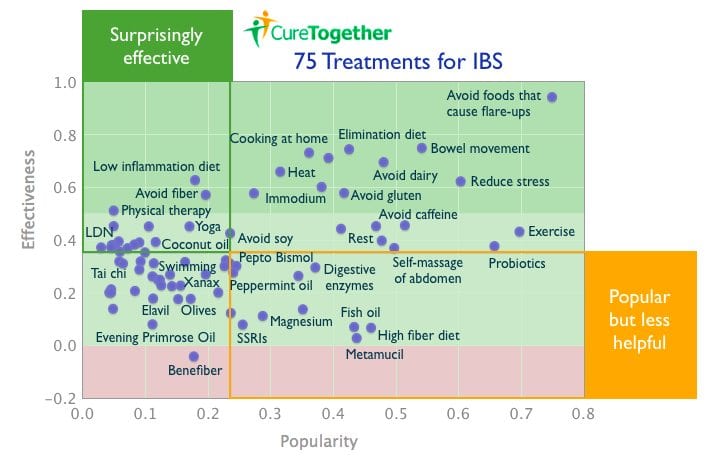 For the live-updated, fully-labelled, interactive version of this infographic, click here.
For the live-updated, fully-labelled, interactive version of this infographic, click here.
By Alexandra Carmichael, Co-Founder of CureTogether
The pain, cramping, and discomfort of Irritable Bowel Syndrome can be distracting and embarrassing. CureTogether, a free resource owned by 23andMe, asked 5,381 people who live with IBS to share what treatments work best for them, and the results are surprisingly lifestyle-driven rather than medical.
People who participated in the survey reported that controlling their diet and reducing stress helped them feel better. They also said that heat and the drug Immodium eased their discomfort. Treatment ideas that didn’t seem to help included fiber supplements, SSRIs, and magnesium.
These are all treatments suggested and reported by patients, so some redundancy in the terms used is to be expected. In addition, the term “treatment” in this study refers to anything patients describe using to help them feel better, whether it is an officially prescribed medical treatment or not.
1. Avoid foods that cause flare-ups
2. Elimination diet
3. Bowel movement
4. Cooking at home
5. Low-carb gluten-free diet
6. Avoid dairy
7. Heat
8. Low inflammation diet
9. Reduce stress
10. Immodium
Where did this data come from? This is the result of a four-year CureTogether study on Irritable Bowel Syndrome, in which 5,381 people shared information about their symptoms and what treatments worked best for them. We’d like to thank those who participated. And just as they shared their experience with treatments, we’re freely and openly sharing the results of the IBS study.
This is part of a regular series of CureTogether research findings. CureTogether’s research findings are different than those made by 23andMe, which look at genetic associations with illness, traits and drug response. But as we continue our work with the CureTogether community, 23andMe hopes to incorporate more of this kind of self-reported information into our own research. CureTogether present its findings just as they are – patient-reported data – to stimulate discussion and generate new insights for further research.
Please tweet, blog, or pass this along to anyone who can benefit or is interested in Irritable Bowel Syndrome. Thank you!